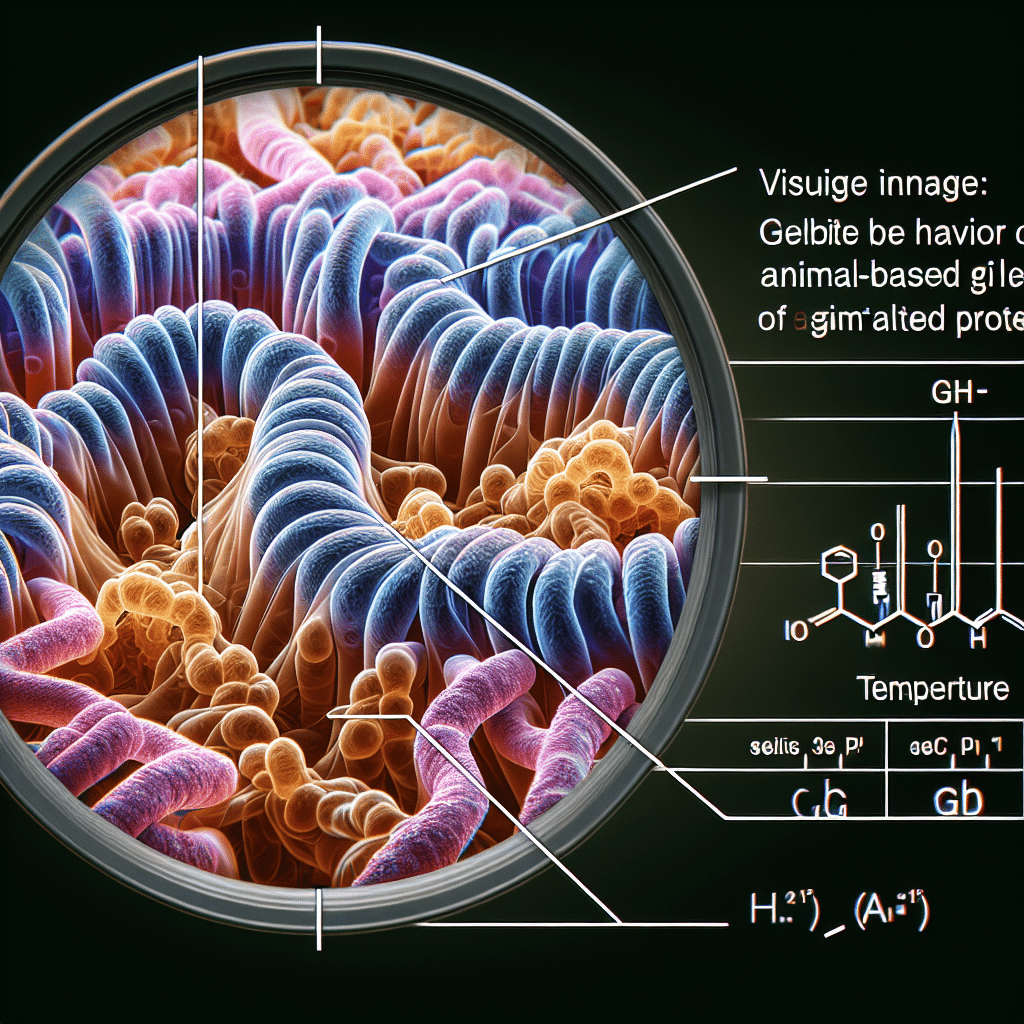Gelling Behavior of Animal-Based Proteins: Key Insights
-
Table of Contents
- Gelling Behavior of Animal-Based Proteins: Key Insights and Applications
- Understanding Protein Gelation
- Factors Influencing Gelling Behavior
- Animal-Based Proteins and Their Gelling Properties
- Applications of Protein Gels in the Food Industry
- Challenges and Innovations in Protein Gelation
- Case Studies and Research Insights
- Conclusion: The Future of Protein Gelation
- Discover ETprotein’s High-Quality Protein Products
Gelling Behavior of Animal-Based Proteins: Key Insights and Applications

The gelling behavior of animal-based proteins is a critical property that has significant implications in the food industry and beyond. Proteins derived from animal sources such as dairy, meat, and fish are essential components of many food products due to their functional properties, including gelation. Gelation is a process where proteins form a three-dimensional network, trapping water and creating a gel-like structure. This article delves into the science behind the gelling behavior of animal-based proteins, exploring its importance, factors affecting gelation, and practical applications.
Understanding Protein Gelation
Protein gelation is a complex process influenced by various factors such as protein concentration, temperature, pH, and the presence of salts or other additives. The process typically involves two stages: protein denaturation and aggregation. During denaturation, proteins unfold and lose their native structure, exposing hydrophobic groups that can interact with each other. In the aggregation phase, these unfolded proteins form a network through physical bonds, resulting in a gel.
Factors Influencing Gelling Behavior
- Protein Source: The source of the protein significantly affects its gelling properties. For instance, collagen from fish has a lower gelling temperature compared to beef collagen.
- Protein Concentration: Higher protein concentrations generally lead to stronger gels due to increased protein-protein interactions.
- Temperature: Temperature plays a dual role in gelation, with heating typically required for denaturation and cooling necessary for gel network formation.
- pH: The pH level can affect the charge on protein molecules, altering their interactions and the strength of the resulting gel.
- Salts and Additives: The presence of salts and other additives can either promote or inhibit gelation by affecting protein solubility and interaction.
Animal-Based Proteins and Their Gelling Properties
Different animal-based proteins exhibit unique gelling behaviors, which are exploited in various food applications:
- Collagen and Gelatin: Derived from connective tissues, these proteins are widely used for their excellent gelling properties in products like gummy candies and marshmallows.
- Casein: The main protein in milk, casein forms gels at room temperature and is used in cheese making and some dairy desserts.
- Whey Proteins: These proteins can form heat-induced gels and are used in products like yogurt and protein bars.
- Egg Proteins: Egg white proteins, particularly ovalbumin, can form strong gels upon heating and are used in baked goods and meringues.
Applications of Protein Gels in the Food Industry
Protein gels are utilized in a variety of food products to improve texture, mouthfeel, and stability:
- Meat Products: Protein gels enhance the texture and water-holding capacity of processed meats like sausages and hams.
- Dairy Alternatives: Gelling proteins are used to mimic the texture of dairy products in plant-based alternatives.
- Desserts: Gelatin and other gelling proteins provide the desired consistency in desserts such as puddings and jellies.
- Functional Foods: Protein gels can encapsulate bioactive compounds, improving the nutritional profile of functional foods.
Challenges and Innovations in Protein Gelation
Despite the widespread use of animal-based protein gels, there are challenges such as variability in raw materials and consumer demand for clean labels. Innovations in this field aim to enhance the consistency and functionality of protein gels while addressing these concerns. For example, the development of cold-set gels that do not require heat for gelation is an area of active research.
Case Studies and Research Insights
Recent studies have focused on optimizing the gelling properties of animal-based proteins for specific applications. For instance, research on the gelation of fish proteins has led to improved surimi products with better texture and shelf-life. Another study on the effects of high-pressure processing on meat proteins has shown potential for creating novel textures in meat products.
Conclusion: The Future of Protein Gelation
The gelling behavior of animal-based proteins is a cornerstone of food science, with ongoing research and development aimed at improving and diversifying its applications. As the industry continues to innovate, we can expect to see new protein-based gels with enhanced functionalities that cater to the evolving needs of consumers and manufacturers alike.
Discover ETprotein’s High-Quality Protein Products
If you’re looking for premium animal-based proteins to enhance your product formulations, consider ETprotein’s offerings. Their commitment to quality and customer satisfaction makes them a top choice for businesses seeking reliable protein solutions.
About ETprotein:
ETprotein, a reputable protein Chinese factory manufacturer and supplier, is renowned for producing, stocking, exporting, and delivering the highest quality organic bulk vegan protein and plant proteins. They include Organic rice protein, clear rice protein, pea protein, clear pea protein, pumpkin seed protein, sunflower seed protein, mung bean protein, peanut protein etc. Their offerings, characterized by a neutral taste, non-GMO, allergen-free attributes, cater to a diverse range of industries. They serve nutraceutical, pharmaceutical, cosmeceutical, veterinary, as well as food and beverage finished product distributors, traders, and manufacturers across Europe, USA, Canada, Australia, Thailand, Japan, Korea, Brazil, and Chile, among others.
ETprotein specialization includes exporting and delivering tailor-made protein powder and finished nutritional supplements. Their extensive product range covers sectors like Food and Beverage, Sports Nutrition, Weight Management, Dietary Supplements, Health and Wellness Products, and Infant Formula, ensuring comprehensive solutions to meet all your protein needs.
As a trusted company by leading global food and beverage brands and Fortune 500 companies, ETprotein reinforces China’s reputation in the global arena. For more information or to sample their products, please contact them and email sales(at)ETprotein.com today.












